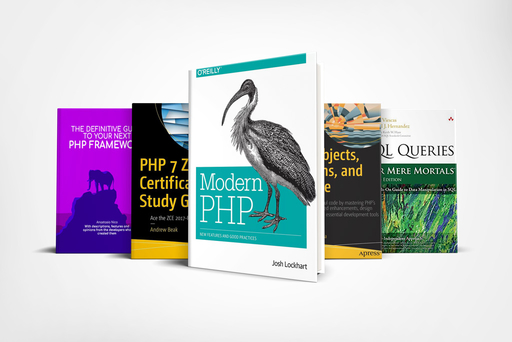How Long Does It Take to Learn PHP? (with time span)
Coding (PHP 8)
From Novice to Ninja, Find Out How Long It Really Takes to Become a Skilled PHP Developer and Propel Your Web Development Career

A while ago in a little town just outside London, there were two brothers, Joseph and Oliver.
After finding some videos on youtube they decided to embark on a coding adventure together.
Joseph was a natural talent, deeply passionate about coding, he quickly skipped through tutorials to create several web applications.
On the other hand, Oliver took a different approach.
Despite not having the same level of innate talent, he was determined to learn.
He invested in books and dedicated blogs, creating a structured study plan to follow.
As time passed, Joseph start creating applications that grew more complex, leading to frustration and eventually, he abandoned coding altogether.
Over a decade, while Joseph chased every new trend that caught his eye, Oliver steadily honed his skills in PHP development.
Do you want to know how long does it take to learn PHP? The short answer is on average 2 to 4 months, mastering it and having a great career. it is a lifetime journey, just like Oliver.
In this blog post, we explore the journey of mastering PHP, uncovering Joseph and Oliver's different paths.
I'll address the burning question on every aspiring developer's mind:
With insights from an expert web developer, we'll shed light on the time and effort needed to become proficient in PHP, as well as the rewards and opportunities that await those who persevere.
Whether you're a natural talent like Joseph or someone willing to put in the hard work like Oliver, this blog post will guide you through the learning process and provide valuable tips to advance your PHP expertise.
The Basics of PHP
Let's start with step 1.
PHP is a versatile and popular server-side scripting language used for creating dynamic web pages and web applications.
It plays a crucial role in the backend of websites, handling tasks such as data processing, form handling, and database interactions.
When you start learning PHP, you'll encounter a straightforward and easy-to-understand syntax.
It's designed to be readable and user-friendly, making it accessible even for beginners like you.
With simple commands and functions, you can quickly start writing PHP code and seeing results in real time.
I have seen interns with no previous experience in coding, starting and getting the hang of it in less than 2 months.
The purpose of PHP extends far beyond creating static web pages.
It empowers you to build interactive and dynamic websites that respond to user actions, display dynamic content, and handle data securely.
From simple contact forms to complex e-commerce platforms, PHP proves to be an invaluable tool in the web development toolbox.
As you dive deeper into PHP, you'll discover its wide range of use cases, from creating content management systems (CMS) to developing powerful web applications.
PHP's versatility enables you to work on a variety of projects and empowers you to bring your creative ideas to life on the web.
Getting Started with PHP (1+ month)
Before diving into writing PHP code, it's essential to set up a proper PHP development environment.
Installing PHP on your computer allows you to run PHP scripts locally and experiment with different features.
If you are completely new to it consider using a popular package like XAMPP or WampServer that includes PHP, Apache, and MySQL, making it easier to develop PHP applications on your computer.
Pro tips: if you are not, use the Docker container instead.
As a beginner, valuable resources and tools will be your guiding light on this PHP learning adventure.
Websites like W3Schools and PHP.net offer comprehensive documentation and tutorials that cover PHP syntax, functions, and concepts.
These resources provide a solid foundation for your PHP learning journey and are a go-to for both beginners and experienced developers.
YouTube is a treasure trove of PHP tutorials and guides, offering a more interactive way to learn.
Many talented PHP developers share their knowledge through video tutorials, which can help you engagingly grasp complex topics.
Check out channels like "The Net Ninja" and "CodeCourse" for valuable PHP insights.
If you prefer a structured learning path, online courses are an excellent choice.
Platforms like Udemy and Coursera offer beginner-friendly PHP courses that guide you through the fundamentals and more advanced topics.
Invest in a course that suits your learning style, and you'll find yourself mastering PHP in no time.
Lastly, always keep the official PHP documentation (php.net) within reach.
It's a comprehensive reference guide that covers every aspect of PHP, making it an invaluable resource for both beginners and experienced developers.
When you have questions or need a quick reference, php.net has got your back.
So, let's recap: get your PHP development environment set up, explore the valuable resources and tools available, and embrace the learning process.
With the right mindset and determination, you'll soon be crafting fantastic PHP applications and unlocking the endless possibilities that PHP has to offer.

Building Strong Foundations (3 to 5 months)
Building strong foundations is the key to becoming a proficient PHP developer.
As you embark on your PHP learning journey, it's crucial to start with the basics and solidify your understanding of fundamental concepts.
First and foremost, take the time to understand data types and variables in PHP.
Data types define the kind of information PHP can work with, such as strings, integers, floats, and booleans.
Variables, on the other hand, act as containers to store data.
Knowing how to declare and use variables effectively will be the building blocks of your PHP code.
Next, dive into control structures and loops, which are essential for making decisions and repeating actions in your PHP programs.
Control structures like if-else statements and switch cases allow you to control the flow of your code based on conditions, while loops like for, while, and do-while enable you to execute code repeatedly.
Mastering these constructs will empower you to create dynamic and interactive PHP applications.
To put your newly acquired knowledge into practice, don't hesitate to start building small projects.
Pick simple PHP scripts to solve everyday problems or create fun applications.
By working on real-world projects, you'll gain confidence in your PHP skills and discover the joy of bringing your ideas to life with code.
Remember, practice makes perfect!
The more you code and experiment with PHP, the more comfortable and proficient you'll become.
Mastering PHP Functions and Object-Oriented Programming (12+ months)
One of the great advantages of PHP is the number of built-in functions that can simplify and streamline your code.
Take the time to explore the extensive PHP function library and familiarize yourself with commonly used functions like `strlen`, `strpos`, `date`, and many others.
Additionally, don't hesitate to create custom functions tailored to your specific project needs.
By encapsulating blocks of code into functions, you'll enhance code reusability and maintainability.
Next, let's talk about object-oriented programming (OOP) in PHP.
OOP is a powerful paradigm that allows you to organize your code into reusable and modular components called classes.
Each class can have properties (variables) and methods (functions) that define its behavior.
By implementing classes, you can create objects and interact with them, promoting better code organization and making your applications more scalable.
Inheritance is another critical concept in OOP.
It allows you to create a new class based on an existing one, inheriting its properties and methods.
This feature enables you to build upon existing code and extend functionality without reinventing the wheel.
Mastering PHP functions and OOP will unlock a whole new world of possibilities for your web development projects.
Start exploring the built-in functions, create your custom functions, and delve into the exciting world of object-oriented programming.
With these advanced skills, you'll be well-equipped to tackle complex projects and take your PHP expertise to new heights.
Working with Databases and Frameworks (lifetime)
With the essential skills written above under your belt, you're now ready to take your PHP career to the next level by working with databases and exploring popular PHP frameworks.
Connecting PHP with databases is a crucial aspect of web development.
Databases, such as MySQL and SQLite, allow you to store and retrieve data, enabling the creation of dynamic and interactive web applications.
Learning how to interact with databases through PHP will open up a world of possibilities for building data-driven websites and applications.
Additionally, diving into popular PHP frameworks like Symfony and Laravel will further enhance your development capabilities.
These frameworks provide a solid foundation and a set of tools that simplify and streamline the development process.
They offer pre-built components, libraries, and patterns that allow you to focus on the unique aspects of your project rather than reinventing the wheel.
By leveraging your knowledge of OOP and PHP frameworks, you can build web applications more efficiently and effectively.
These skills will empower you to create complex, feature-rich websites with ease.
Moreover, working with databases and frameworks will give you a deeper understanding of real-world development scenarios, making you a well-rounded and sought-after PHP developer.
The ability to connect PHP with databases and leverage the power of frameworks will elevate your coding abilities and enable you to build dynamic and interactive web applications that captivate users and clients alike.
Conclusion
Now you know what you should need and how long it takes to have a solid understanding of PHP fundamentals, object-oriented programming, working with databases, and exploring powerful frameworks.
Remember, mastering PHP is not an overnight task.
It's a continuous learning process that takes time and dedication.
Don't be discouraged by the challenges you may encounter along the way.
Embrace them as opportunities to grow and improve your skills.
As you continue on your PHP journey, keep exploring, experimenting, and building.
Each project you create, each problem you solve, and each line of code you write contributes to your growth as a PHP developer.
Stay curious and open-minded, and don't hesitate to seek help from the vast PHP community if you ever need guidance.
Mastery may take years or even decades, but the rewards are truly worth it.
With every milestone you achieve, you'll gain confidence and expertise in PHP.
You'll be able to create sophisticated and dynamic web applications that leave a lasting impact.
So, keep pushing forward, and don't forget that learning is a lifelong adventure.
Your dedication and passion for coding will lead you to new heights and exciting opportunities in the world of web development.
If you want to explore more about PHP and web development pretty often other then doing this as a full-time job so SUBSCRIBE to the newsletter.
If you subscribe you will also receive a list of my favourite book about PHP and their reviews
